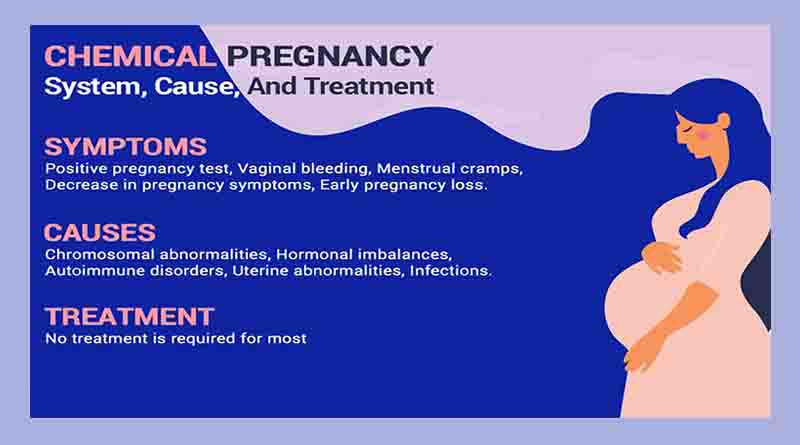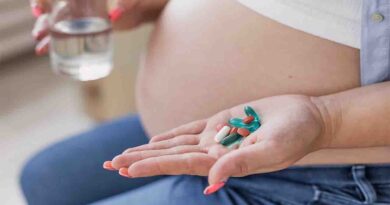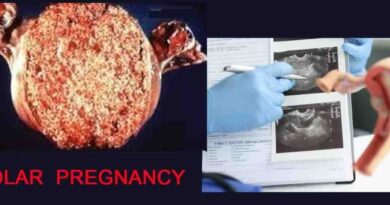Chemical Pregnancy: Causes, Symptoms & Treatment
Chemical pregnancies are a relatively common but often misunderstood occurrence during early pregnancy. These pregnancies are characterized by very early miscarriages that happen before an embryo can be seen on an ultrasound. While chemical pregnancies can be emotionally distressing, understanding their causes, symptoms, and treatment options can help individuals navigate this challenging experience.
Understanding Chemical Pregnancy
What is a Chemical Pregnancy?
A chemical pregnancy occurs when a fertilized egg implants in the uterus but doesn’t develop into a viable pregnancy. The term “chemical” is used because the pregnancy can be confirmed only through chemical tests, like blood or urine tests for human chorionic gonadotropin (hCG), a hormone produced during pregnancy.
When Does it Happen?
Chemical pregnancies typically occur within the first few weeks of conception, often before a woman even misses her period. This early stage is why many women might not realize they were briefly pregnant.
Causes of Chemical Pregnancy
-
- Chromosomal Abnormalities: Most chemical pregnancies result from chromosomal abnormalities in the embryo, preventing it from developing properly.
- Hormonal Imbalances: Issues with hormones like progesterone can affect the uterine lining’s ability to support pregnancy.
- Uterine Abnormalities: Structural issues in the uterus can sometimes prevent a fertilized egg from implanting properly.
Symptoms of Chemical Pregnancy
The signs and symptoms of a chemical pregnancy can vary, but here are some common indicators:
- Delayed Menstruation: Your period may come about a week later than your usual menstrual cycle.
- Positive Pregnancy Test: Initially, you may have a positive pregnancy test result, confirming that you are pregnant.
- Subsequent Period: Despite the positive pregnancy test, you may experience your period shortly after. This can be heavier than usual and accompanied by more intense menstrual cramps.
- Changing Pregnancy Test Results: You might notice a positive pregnancy test result followed by a negative result on a subsequent test a few weeks later.
- Lack of Early Pregnancy Symptoms: Unlike typical early pregnancies, you may not experience common signs of pregnancy, such as breast tenderness, morning sickness, or fatigue.
- Bleeding and Cramping: Many women experience light bleeding and mild cramps, which they might mistake for a normal menstrual period.
It’s important to note that the only way to definitively confirm a chemical pregnancy is through pregnancy testing. If you suspect you’ve had a chemical pregnancy or are experiencing unusual symptoms related to your pregnancy, it’s advisable to consult with a healthcare provider for appropriate evaluation and guidance.
Seeking Medical Help
Confirming the Pregnancy
A blood test at a healthcare provider’s office can confirm a chemical pregnancy by measuring hCG levels.
Monitoring hCG Levels
Doctors may monitor hCG levels over a few days to ensure they drop, indicating the end of the pregnancy.
Addressing Underlying Causes
For recurrent chemical pregnancies, doctors may investigate and address underlying factors such as hormonal imbalances or uterine issues.
Treatment and Moving Forward
Emotional Support
Emotional support is crucial after experiencing a chemical pregnancy. Counseling or support groups can help individuals cope with grief and anxiety.
Physical Recovery
Most women recover physically from a chemical pregnancy without the need for medical intervention. However, in some cases, a healthcare provider may recommend a procedure to remove the remaining tissue.
Future Fertility
A chemical pregnancy usually doesn’t indicate future fertility problems. Most women go on to have healthy pregnancies afterward.
What is the difference between a chemical pregnancy and a clinical pregnancy?
Chemical pregnancies and clinical pregnancies are both stages of early pregnancy, but they differ in significant ways:
Chemical Pregnancy:
- Timing: A chemical pregnancy is an extremely early pregnancy loss that occurs shortly after implantation, often before a woman even misses her period. It’s called “chemical” because it can be confirmed only through chemical tests for the presence of the hormone hCG.
- Symptoms: The primary symptom of a chemical pregnancy is often mild bleeding and cramping. Some women may experience a delayed period or a positive pregnancy test followed by a negative one.
- Viability: Unfortunately, chemical pregnancies are not viable pregnancies. They result from issues like chromosomal abnormalities or hormonal imbalances, preventing the embryo from developing properly.
- Medical Intervention: In most cases, chemical pregnancies resolve on their own without the need for medical intervention. However, a doctor may recommend monitoring hCG levels or a procedure to remove remaining tissue in some instances.
Clinical Pregnancy:
- Timing: A clinical pregnancy is a confirmed, viable pregnancy that progresses beyond the early stages. It is usually confirmed through an ultrasound or visual evidence of a developing embryo.
- Symptoms: In a clinical pregnancy, symptoms often include missed periods, positive pregnancy tests, and typical signs of pregnancy such as breast tenderness, nausea, and fatigue.
- Viability: Clinical pregnancies have a higher chance of progressing to a live birth. They indicate that the embryo has been implanted successfully and is developing in the uterus.
- Medical Care: Clinical pregnancies typically require ongoing prenatal care, including regular doctor visits, ultrasounds, and monitoring of the pregnancy’s progress.
In summary, the key difference between a chemical pregnancy and a clinical pregnancy is its viability and timing. A chemical pregnancy is an early pregnancy loss that occurs shortly after implantation and is often non-viable, whereas a clinical pregnancy is a viable pregnancy that progresses beyond the early stages and can result in the birth of a healthy baby.
Is a chemical pregnancy a real pregnancy?
A chemical pregnancy is considered a real pregnancy, even though it ends very early in the gestational process. This is because a chemical pregnancy involves the initial stages of pregnancy, where an embryo implants into the uterus and releases the hormone hCG (human chorionic gonadotropin), which is what pregnancy tests detect.
However, as you mentioned, a chemical pregnancy is different from a clinical pregnancy in that it ends before there is evidence of a developing fetus. In a clinical pregnancy, you typically see evidence of fetal development through ultrasounds, and sometimes you can even hear the fetal heartbeat.
The emotional experience and what makes a pregnancy feel “real” can vary greatly from person to person. Some individuals may consider the moment they receive a positive pregnancy test result as the point when the pregnancy feels real, while others might need to see or hear more advanced signs of pregnancy, like a heartbeat, to feel that sense of reality.
Ultimately, every individual’s experience with pregnancy is valid, and the emotional impact of a chemical pregnancy should not be dismissed because it occurs early in the pregnancy journey. It can still be a significant and emotional experience for those who go through it.
Is a chemical pregnancy bad?
A chemical pregnancy is not inherently “bad” in the sense of moral judgment. It’s a biological occurrence where an early pregnancy ends shortly after implantation, usually before or around the time of a missed period. The emotional response to a chemical pregnancy can vary greatly among individuals.
For some, learning about a chemical pregnancy might be a relief, especially if the pregnancy was unintended or unexpected. On the other hand, it can be heartbreaking for those who have been actively trying to conceive and experiencing fertility challenges. The emotional impact is valid, and people may experience a range of emotions, including sadness, disappointment, grief, or frustration.
The important thing to remember is that a chemical pregnancy doesn’t necessarily indicate underlying fertility issues, and it doesn’t mean that you can’t have a successful pregnancy in the future. Many individuals who experience a chemical pregnancy go on to have healthy pregnancies and deliver healthy babies later on. It’s essential to seek support, whether emotional or medical, if you’re struggling with the emotional impact of a chemical pregnancy or if you have concerns about your fertility.
Who do chemical pregnancies affect?
Chemical pregnancies can affect anyone who has the potential to become pregnant. They are not limited to specific groups or demographics. However, some factors may increase the likelihood of experiencing a chemical pregnancy or early miscarriage. These risk factors can include:
- Maternal Age: Women who are 35 years old or older may have a higher risk of early pregnancy loss, including chemical pregnancies.
- Uterine Abnormalities: Having an atypically shaped uterus or uterine abnormalities can increase the risk of early miscarriages.
- Hormone Imbalances: Hormone levels that are either too high or too low, including conditions like polycystic ovarian syndrome (PCOS) or thyroid disorders, can impact pregnancy viability.
- Sexually Transmitted Infections (STIs): Certain STIs can affect reproductive health and increase the risk of pregnancy complications.
- Medical Conditions: Conditions like diabetes can impact fertility and pregnancy outcomes.
It’s essential for individuals who are trying to conceive and have concerns about their fertility or have experienced recurrent chemical pregnancies to consult with a healthcare provider. A healthcare provider can help assess potential underlying factors, provide guidance on improving fertility, and offer support throughout the process.
How common are chemical pregnancies?
Chemical pregnancies are relatively common, with a significant percentage of pregnancies ending in early miscarriage. Here are some key statistics:
- Frequency of Early Pregnancy Loss: About a quarter (25%) of all pregnancies end before the first 20 weeks. This includes both chemical pregnancies and other types of early miscarriages.
- Early Miscarriages: Approximately 80% of miscarriages occur during the early stages of pregnancy, which can include chemical pregnancies.
- Underreporting: It can be challenging to determine the exact prevalence of chemical pregnancies because many individuals may experience very early miscarriages without even realizing they are pregnant. These cases often go undiagnosed.
Given the high occurrence of chemical pregnancies and early miscarriages, it’s essential for individuals who are trying to conceive to be aware of the possibility and to seek medical advice and support if they experience recurrent pregnancy loss or have concerns about their fertility.
What does chemical pregnancy bleeding look like?
The appearance of bleeding during a chemical pregnancy can vary among individuals. It might resemble a typical menstrual period for some, while others may experience distinct characteristics such as:
- Normal Menstrual Bleeding: In some cases, the bleeding associated with a chemical pregnancy may closely resemble a regular menstrual period. This could include a consistent flow of blood with typical menstrual symptoms.
- Heavier Than Usual: For others, the bleeding might be heavier than their typical menstrual flow, leading to more pronounced cramping.
- Spotting Followed by Heavy Bleeding: Some individuals might initially experience spotting, which then progresses to heavy bleeding. This can sometimes include the passage of blood clots.
It’s essential to remember that the appearance and intensity of bleeding can vary from person to person. If you suspect you’re experiencing a chemical pregnancy or have concerns about the bleeding you’re experiencing, consulting with a healthcare provider can provide clarity and guidance on the situation.
How long does chemical pregnancy last?
A chemical pregnancy typically lasts for a brief period, usually a few days to a week. It occurs very early in pregnancy, shortly after implantation, and often before any pregnancy symptoms become noticeable. The term “chemical” pregnancy refers to the biochemical changes that indicate a very early pregnancy, and it can end as soon as these changes are no longer detectable.
The bleeding associated with a chemical pregnancy, which can resemble a heavier menstrual period, usually occurs during this time frame. If you suspect you’ve had a chemical pregnancy or are experiencing unusual bleeding or symptoms, it’s advisable to consult with a healthcare provider for guidance and support. They can provide a proper evaluation and discuss any concerns you may have.
A chemical pregnancy can be a difficult and emotional experience for anyone trying to conceive. Understanding the causes, recognizing the symptoms, and seeking proper medical guidance and emotional support are crucial steps in navigating this journey. Remember that you are not alone, and there is hope for future successful pregnancies.




